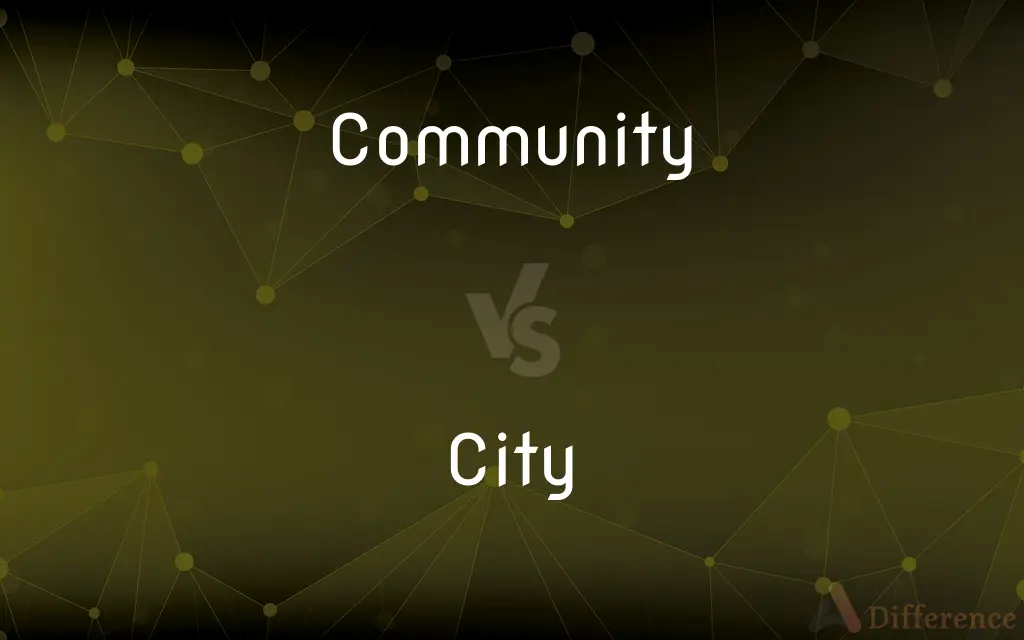Community vs. City — What's the Difference?
Edited by Tayyaba Rehman — By Urooj Arif — Updated on March 8, 2024
A community is a group of people with common interests or characteristics, living in a specific area or connected by shared values, whereas a city is a large, densely populated urban area with specific administrative, legal, and historical status.

Difference Between Community and City
Table of Contents
ADVERTISEMENT
Key Differences
A community represents a social unit where individuals share certain aspects of their lives, such as interests, cultures, values, or geographical location. It emphasizes social bonds and collective identity, often transcending physical boundaries. On the other hand, a city is defined by its significant population size, concentration of buildings and infrastructure, and its role as a center for economic, political, and cultural activities. It is recognized by specific legal boundaries and governance structures that administer local services and regulations.
While communities can form within cities, based on neighborhoods, interests, or other social connections, cities encompass a broader range of functions, including governance, urban planning, and provision of essential services like education, healthcare, and transportation. Communities focus more on the interpersonal relationships and shared experiences of their members, whereas cities are concerned with spatial, economic, and administrative aspects of managing an urban area.
Communities may exist without a defined physical space, such as online communities or groups united by common causes or interests. Conversely, a city's identity and functionality are inherently linked to its physical location, infrastructure, and legal jurisdiction. This difference highlights the social versus spatial nature of communities and cities, respectively.
The concept of a community is flexible and can adapt to the changing dynamics of its members' interests and relationships. In contrast, changes within a city involve complex processes of urban planning, legal adjustments, and infrastructural development, reflecting a more rigid and structured approach to adaptation and growth.
The sense of belonging in a community is derived from shared values, cultural practices, or common goals, fostering a sense of identity and support among its members. In a city, while a sense of community can also exist, the connection among its residents may be influenced by the city’s amenities, opportunities, and living conditions, rather than solely by interpersonal relationships.
ADVERTISEMENT
Comparison Chart
Definition
A group of people connected by shared values or interests.
A large, densely populated urban area with governance.
Basis
Social bonds, shared interests or characteristics.
Geographic location, legal status, infrastructure.
Scope
Can be geographically bound or dispersed.
Geographically specific with defined boundaries.
Function
Fosters social connections, support, identity.
Provides services, governance, economic activities.
Formation
Formed around common interests or values.
Established through legal processes, urban planning.
Compare with Definitions
Community
Members supporting each other’s growth.
The artist community in the city collaborates on projects.
City
An urban center with specific legal boundaries.
The city’s expansion plans must be approved by the municipal government.
Community
An online group with shared goals.
The online gaming community gathers virtually for tournaments.
City
A place offering a wide range of services and amenities.
The city provides extensive public transportation options.
Community
A sense of belonging based on shared identity.
The expatriate community provides a sense of home away from home.
City
A hub for economic, cultural.and political activities.
The city attracts tourists from around the world with its historic sites and festivals.
Community
People living in the same area or under the same conditions.
The mountain community is known for its close-knit residents.
City
Governed by a municipal authority.
The city council passed a new ordinance to improve public safety.
Community
A group sharing common interests.
The local gardening community shares tips and seeds.
City
A large, densely populated area with administrative powers.
New York City is known for its diverse culture and economic opportunities.
Community
A community is a social unit (a group of living things) with commonality such as norms, religion, values, customs, or identity. Communities may share a sense of place situated in a given geographical area (e.g.
City
A city is a large human settlement. It can be defined as a permanent and densely settled place with administratively defined boundaries whose members work primarily on non-agricultural tasks.
Community
A group of people living in the same locality and under the same government.
City
A large town
One of Italy's most beautiful cities
The city council
Community
The district or locality in which such a group lives.
City
Short for City of London
Community
A group of people having common interests
The scientific community.
The international business community.
City
A center of population, commerce, and culture; a town of significant size and importance.
Community
A group viewed as forming a distinct segment of society
The gay community.
The community of color.
City
An incorporated municipality in the United States with definite boundaries and legal powers set forth in a charter granted by the state.
Community
Similarity or identity
A community of interests.
City
A Canadian municipality of high rank, usually determined by population but varying by province.
Community
Sharing, participation, and fellowship
A sense of community.
City
A large incorporated town in Great Britain, usually the seat of a bishop, with its title conferred by the Crown.
Community
Society as a whole; the public.
City
The inhabitants of a city considered as a group.
Community
A group of organisms interacting with one another and with the environment in a specific region.
City
An ancient Greek city-state.
Community
The region occupied by a group of interacting organisms.
City
(Slang) Used in combination as an intensive
The playing field was mud city after the big rain.
Community
(countable) A group sharing a common understanding, and often the same language, law, manners, and/or tradition.
City
City The financial and commercial center of London. Used with the.
Community
(countable) A residential or religious collective; a commune.
City
A large settlement, bigger than a town; sometimes with a specific legal definition, depending on the place.
São Paulo is the largest city in South America.
Community
A group of interdependent organisms inhabiting the same region and interacting with each other.
City
(UK) A settlement granted special status by royal charter or letters patent; traditionally, a settlement with a cathedral regardless of size.
Community
A group of people interacting by electronic means for educational, professional, social, or other purposes; a virtual community.
City
(Australia) The central business district; downtown.
I'm going into the city today to do some shopping.
Community
(uncountable) The condition of having certain attitudes and interests in common.
City
(slang) A large amount of something used after the noun.
It’s video game city in here!
Community
Common enjoyment or possession; participation.
A community of goods
City
A large town.
Community
Common character; likeness.
City
A corporate town; in the United States, a town or collective body of inhabitants, incorporated and governed by a mayor and aldermen or a city council consisting of a board of aldermen and a common council; in Great Britain, a town corporate, which is or has been the seat of a bishop, or the capital of his see.
A city is a town incorporated; which is, or has been, the see of a bishop; and though the bishopric has been dissolved, as at Westminster, it yet remaineth a city.
When Gorges constituted York a city, he of course meant it to be the seat of a bishop, for the word city has no other meaning in English law.
Community
Commonness; frequency.
City
The collective body of citizens, or inhabitants of a city.
Community
A local area within a county or county borough which is the lowest tier of local government, usually represented by a community council or town council, which is generally equivalent to a civil parish in England.
City
Of or pertaining to a city.
Community
Common possession or enjoyment; participation; as, a community of goods.
The original community of all things.
An unreserved community of thought and feeling.
City
A large and densely populated urban area; may include several independent administrative districts;
Ancient Troy was a great city
Community
A body of people having common rights, privileges, or interests, or living in the same place under the same laws and regulations; as, a community of monks. Hence a number of animals living in a common home or with some apparent association of interests.
Creatures that in communities exist.
City
An incorporated administrative district established by state charter;
The city raised the tax rate
Community
Society at large; a commonwealth or state; a body politic; the public, or people in general.
Burdens upon the poorer classes of the community.
City
People living in a large densely populated municipality;
The city voted for Republicans in 1994
Community
Common character; likeness.
The essential community of nature between organic growth and inorganic growth.
Community
Commonness; frequency.
Eyes . . . sick and blunted with community.
Community
A group of people living in a particular local area;
The team is drawn from all parts of the community
Community
A group of people having ethnic or cultural or religious characteristics in common;
The Christian community of the apostolic age
He was well known throughout the Catholic community
Community
Common ownership;
They shared a community of possessions
Community
A group of nations having common interests;
They hoped to join the NATO community
Community
The body of people in a learned occupation;
The news spread rapidly through the medical community
Community
Agreement as to goals;
The preachers and the bootleggers found they had a community of interests
Community
A district where people live; occupied primarily by private residences
Community
(ecology) a group of interdependent organisms inhabiting the same region and interacting with each other
Common Curiosities
How do cities support community development?
Cities support community development through urban planning, providing public spaces, and facilitating social services.
What challenges do cities face?
Cities face challenges such as urban sprawl, pollution, housing affordability, and maintaining infrastructure.
How is a city characterized?
A city is characterized by its significant population, legal boundaries, and role as a center for services, governance, and activities.
How do communities adapt to change?
Communities adapt through flexibility, innovation, and the collective effort of their members to address new challenges or opportunities.
Can a person belong to multiple communities?
Yes, individuals can belong to multiple communities, each with different interests, goals, or geographical locations.
What distinguishes a city from a town or village?
Cities are larger than towns or villages, with greater population density, more complex infrastructure, and broader administrative functions.
What defines a community?
A community is defined by social bonds and shared interests or characteristics among its members.
Can a city be a community?
While a city itself is not a community, it can encompass various communities within its boundaries.
What is the importance of communities within cities?
Communities within cities enhance social cohesion, provide support networks, and enrich the cultural landscape.
What role does governance play in a city?
Governance in a city involves managing resources, services, laws, and infrastructure to meet the residents' needs.
How can individuals contribute to their community?
Individuals can contribute by participating in community activities, supporting local initiatives, and fostering inclusive environments.
What impact does urban planning have on community development within cities?
Urban planning shapes community development by designing spaces that facilitate social interaction, accessibility, and cultural activities.
How do economic activities in cities benefit communities?
Economic activities provide employment, foster local businesses, and support community services and amenities.
Are online communities considered real communities?
Yes, online communities are real, offering platforms for shared interests and support, despite lacking a physical location.
How do legal boundaries affect city management?
Legal boundaries define the jurisdiction for city management, determining the scope of governance, services, and urban development initiatives.
Share Your Discovery

Previous Comparison
Acne vs. Priest
Next Comparison
Hopping vs. ShoppingAuthor Spotlight
Written by
Urooj ArifUrooj is a skilled content writer at Ask Difference, known for her exceptional ability to simplify complex topics into engaging and informative content. With a passion for research and a flair for clear, concise writing, she consistently delivers articles that resonate with our diverse audience.
Edited by
Tayyaba RehmanTayyaba Rehman is a distinguished writer, currently serving as a primary contributor to askdifference.com. As a researcher in semantics and etymology, Tayyaba's passion for the complexity of languages and their distinctions has found a perfect home on the platform. Tayyaba delves into the intricacies of language, distinguishing between commonly confused words and phrases, thereby providing clarity for readers worldwide.















































